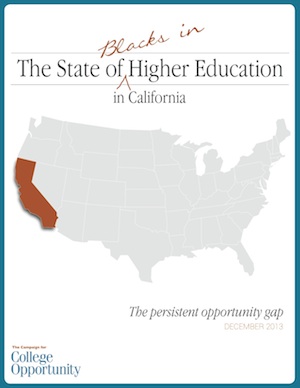 The Campaign for College Opportunity has issued a new report on the status of African Americans in higher education in the state of California.
The Campaign for College Opportunity has issued a new report on the status of African Americans in higher education in the state of California.
The State of Blacks in Higher Education in California: The Persistent Opportunity Gap finds that there has been no progress in closing the racial gap in enrollments and degree attainment over the past decade.
Among the findings in the report are:
* In 2012, more Black students in California were enrolled in private, for-profit colleges than in California State University and the University of California combined.
* Black students experience the lowest admission rates to the University of California of any racial/ethnic group.
* Black students are the most likely to gain some college experience without earning a college degree.
* A smaller share of today’s California Black young adult population (25 to 34 years of age) holds postsecondary degrees than that of Blacks between the ages of 35 and 64.
The authors of the report conclude, “As a state, we have fallen short on the promise of offering each new generation better opportunities for advancement through education and we should fear complacency toward this trend. The persistent disparities between Black students and their counterparts should sound an alarm for Californians and our elected leaders to make a concerted effort to systematically narrow and close these gaps. To do otherwise is to accept a society of ‘haves and have nots,’ and questions our state’s commitment to diversity, inclusion, and equity.”
To download the complete report, click here.








A Long Road Ahead
Being an African-American and member of the faculty at a California university and an attendee at the Bill and Melinda Gates Foundation event recently where this report was first presented, it has been obvious to me and other African-American educational professionals that the problem lies in many areas. One of the many problems regarding the success of our children (especially males) at majority universities is the lack of a solid K-12 educational experience. We can always look at families, communities and other factors. But, the K-12 experience for African-Americans especially in public schools “sucks” at best. There are new schools coming on line in the urban areas of California to attack this problem. But, this will take many years to overcome and we must also educate the parents of these kids. In other words, we must multi-task this issue, now